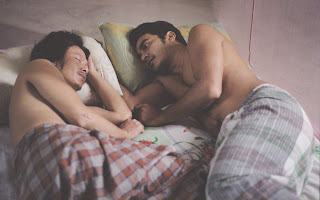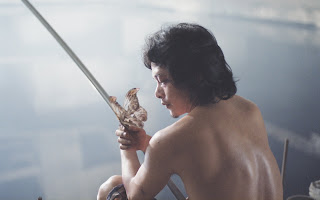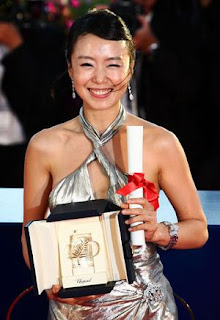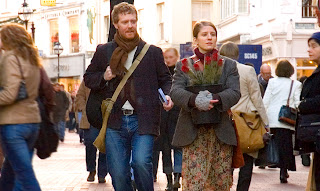.jpg)
I Don't Want to Sleep Alone (Hei Yan Quan). 2006. Written and directed by Tsai Ming-liang. Produced by Bruno Persery and Vincent Wang. Cinematography by Liao Pen-jung. Edited by Cheng Shang-chang. Art direction by Lee Tian-jue and Gan Siong-king. Sound design by Tu Duu-chih and Tang Shiang-chu. Lighting by Lee Long-yu. Costumes by Sun Hui-mey. Released by Strand Releasing.
Cast: Lee Kang-sheng (Homeless Guy/Paralyzed Guy), Chen Shiang-chyi (Coffee-shop Waitress), Norman Atun (Rawang), Pearlly Chua (Coffee-shop Lady Boss), Liew Lee-lin (Coffee-shop Tea Maker), Leonard Tee (Light Vendor), Samantha Toh Su-yee (Coffee-shop Lady Boss' Second Son), Chiew Kok-fai (Coffee-shop Lady Boss' Grandson), Chan Rong-sin (Real Estate Broker), Loh Kok-choy (Enterprise Representative), Shiva (Indian Laborer).
I Don’t Want to Sleep Alone, the title of the beautiful new film from Taiwanese master Tsai Ming-liang, could apply equally to any of his other features, since this film similarly explores the actions of near-mute, lonely souls searching for connection. After the mélange of hard-core imagery, musical sequences, and no-exit desolation that was his previous film, The Wayward Cloud, the film at first glance seems like a retreat into safer, familiar territory. Indeed, Tsai’s usual iconography is fully present: the water, the sparse dialog, the long takes, the taciturn, isolated characters. Although at first this seems like a step backward, as the film unfolds, it becomes apparent there are some intriguingly different things happening here.
For Tsai, this new film’s major departure is its setting. Instead of the familiar Taipei haunts we have been used to, the action here has been transplanted to Kuala Lumpur, Malaysia. This is the first film Tsai has shot in his birth country (he moved to Taiwan at the age of 20). This change of milieu injects new sounds and a sense of curious discovery to the film. The first dialogue we hear is the loud voice of a Malay numbers runner exhorting a crowd of people to buy number from him, guaranteeing them great riches. “I’ve prayed to the gods,” he insists. Tsai’s regular lead actor and cinematic alter-ego Lee Kang-sheng, looking scruffier than usual, plays a homeless drifter in the midst of this crowd. He foolishly gets his numbers without having the money to pay for them, and is promptly beaten, quite badly, by the numbers runner and his cohorts. He is found by Rawang (Norman Chua), an immigrant worker, who carries him to an abandoned building where he is squatting with his coworkers. Rawang carries “Homeless Guy” (as Lee is named in the credits) on a dirty mattress found on the street. This mattress plays a major role in the film, and it will be carried by various characters in a recurring image in the film.
To backtrack a bit, the film’s very first image is of a catatonic man (Lee Kang-sheng again, this time as “Paralyzed Guy”), on a hospital bed being fed through the nose as Mozart plays on the radio. This is a direct reference to the genesis of Tsai’s film, which is one of the “New Crowned Hope” series of films commissioned by producer Peter Sellars as part of the commemoration of Mozart’s 250th anniversary. His head is shaven, and he lies still in a long shot as the light coming through the window changes.
The film alternates between the paralyzed man and the homeless man, both being attended to by their respective caretakers. This aspect lends the film a sense of tenderness and poignancy, since the act of nurturing and caring for others is a major motif here. Both of Lee Kang-sheng’s characters are connected intimately to three others; besides the construction worker Rawang, he meets a melancholy coffee-shop waitress (Tsai regular Chen Shang-chyi) and her tyrannical female boss (Pearlly Chua). Tsai is teasingly oblique about the connection between these two narrative strands, and it isn’t until quite late in the film that the relation between them is revealed, and it is quite a startling moment when that happens.
Music plays a major role in the film. Besides the opening Mozart piece, which recurs throughout, Tsai uses Bollywood numbers and old Chinese tunes, as well as Malay folk songs. Much like the songs in The Hole and The Wayward Cloud, they serve as surrogate speech for these inarticulate characters, conveying the desire and longing that they can’t or won’t express for themselves. However, instead of being relegated to the realm of movie musical fantasy as in his previous films, the songs in I Don’t Want to Sleep Alone exist on the same physical plane as the characters, emanating from radios and televisions, and in the case of the Malay folk song, from a pair of street musicians.
.jpg)
The joy and surprise of Tsai’s film lies in discovering how all these elements fit together. The tone is much lighter than usual for Tsai, culminating in a hilarious attempted sexual encounter through a thick, toxic haze. I won’t spoil any more for you, other than to say that the film ends on what is perhaps the loveliest (and most hopeful) image in Tsai’s entire oeuvre. It brought tears to my eyes, and all by itself justifies this film’s existence. All that is left for me to say is, see this film. Right now. Immediately. No, I mean it. Stop whatever you’re doing and go see it. I swear you won’t regret it.
And to further whet your appetite, here's the film's trailer:
I Don't Want to Sleep Alone opened in New York on May 9 at the
IFC Center.
.jpg)


.jpg)
.jpg)






